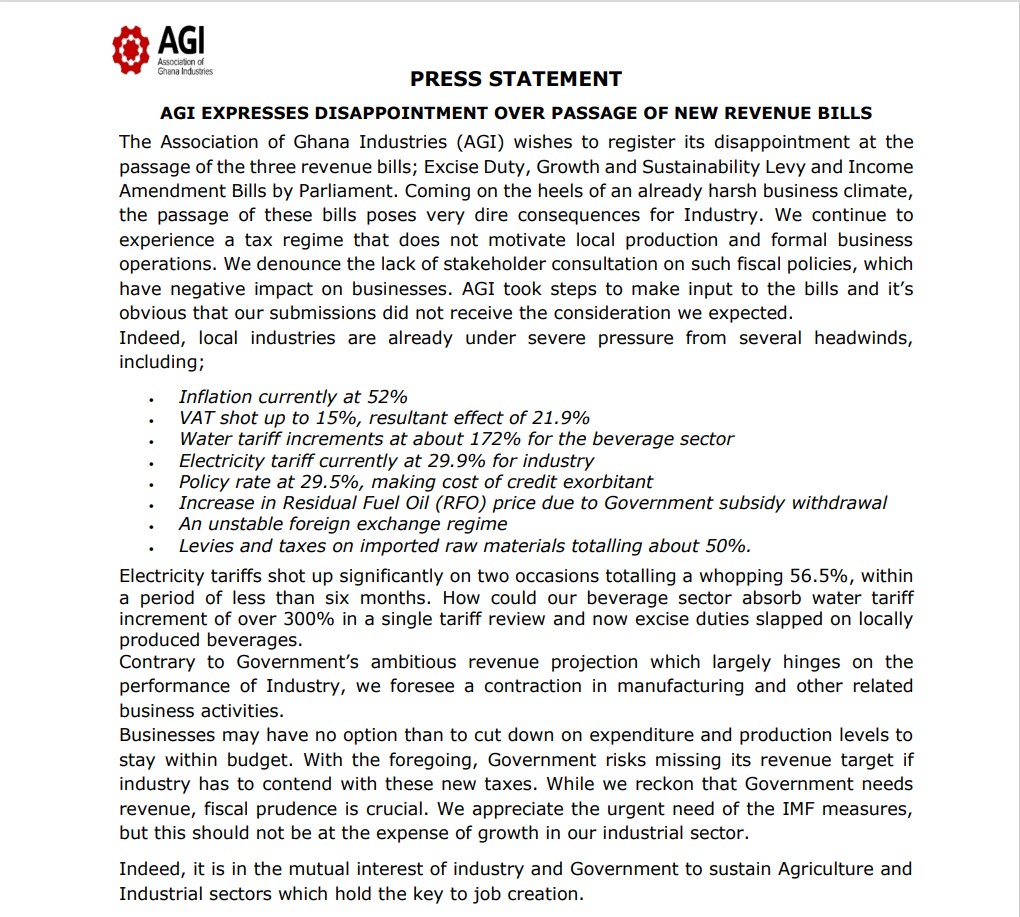The Association of Ghana Industries (AGI) says the government risks missing its targeted GHȼ3.8 billion it hopes to raise from the three newly introduced taxes.
Parliament on Friday controversially passed the three bills - Excise Duty, Growth and Sustainability Levy and Income Tax Amendment bills after fierce resistance by Minority MPs who narrowly lost the vote to approve the bills by 136 to 137.
According to the Finance Ministry, the three bills are expected to individually rake in the following;
- Income Tax Amendment Bill, 2022 = GH¢1.2 billion annually
- Excise Duty Amendment Bill, 2022 = GH¢400 million annually
- Growth and Sustainability Amendment Bill, 2022, = GH¢2.2 billion annually
The AGI in a statement said the government may not realise the revenue “if industry has to contend with these new taxes.”
According to the AGI, while it reckons that Government needs revenue, it is crucial for government to observe fiscal prudence.
“We appreciate the urgent need of the IMF measures, but this should not be at the expense of growth in our industrial sector.
“Indeed, it is in the mutual interest of industry and Government to sustain Agriculture and Industrial sectors which hold the key to job creation.”
The AGI consequently called on the government to engage industry “on measures to incentivise our local industries to forestall the negative consequences of these policies. To this end, we welcome the opportunity to dialogue with Government on how to save jobs and the strategic options to explore in cushioning our local industries.”
The AGI in the statement issued by its Chief Executive, Seth Twum-Akwaboah, expressed disappointment in the passage of the three bills by parliament.
The AGI which listed a number of challenges confronting industries, said electricity tariffs for instance shot up significantly on two occasions totalling a whopping 56.5%, within a period of less than six months.
It said the beverage sector cannot absorb water tariff increment of over 300% and contrary to government's ambitious revenue projection which largely hinges on the performance of Industry, the AGI foresees a contraction in manufacturing and other related business activities.
Businesses may have no option than to cut down on expenditure and production levels to stay within budget.
Among the litany of challenges, according to the AGI, are;
- • Inflation currently at 52%
- • VAT shot up to 15%, resultant effect of 21.9%
- • Water tariff increments at about 172% for the beverage sector
- • Electricity tariff currently at 29.9% for industry
- • Policy rate at 29.5%, making cost of credit exorbitant
- • Increase in Residual Fuel Oil (RFO) price due to Government subsidy withdrawal
- • An unstable foreign exchange regime
- • Levies and taxes on imported raw materials totalling about 50%.

Latest Stories
-
Livestream: The Law discusses “The False News Crime”
17 minutes -
Ashanti Presbytery holds 15 synod with renewed call for care for environment
37 minutes -
NGO Today for Tomorrow hands over 7-classroom block to Sakasaka Cluster of Schools in Tamale
38 minutes -
FDA confiscates illicit tobacco products in Accra
39 minutes -
Dr. Apaak welcomes Canadian International Development Scholarships team
43 minutes -
Police apprehend one more suspect in the killing of 26-year-old footballer in Tamale
1 hour -
Thaddeus Sory accuses Godfred Dame of hypocrisy
2 hours -
Tamale becoming transit point for drugs and arms – Northern Regional Police raise alarm
3 hours -
Thaddeus Sory to Dame: And still crying, even more incongruously – Part I
3 hours -
‘Confidence of the boys seem to be back’ – Kurt Okraku on Black Stars’ performance
3 hours -
IMCC holds strategic dialogue with experts on L.E.D
3 hours -
NDPC and IMCC collaborate to drive decentralisation reforms
3 hours -
‘Let us reaffirm our commitment to building a continent of prosperity’- Mahama to African leaders
3 hours -
Return stolen artefacts and cultural treasures that rightfully belong to our heritage – Mahama to colonial rulers
3 hours -
The Great Legal Showdown: Ego, Arrogance, and Popcorn!
3 hours

